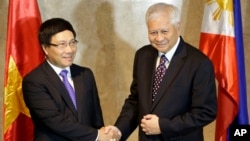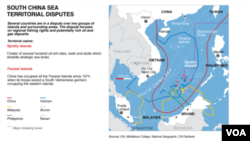MANILA —
Foreign ministers from the Philippines and Vietnam said they have agreed to work together on a framework for resolving maritime territorial disputes in the South China Sea. Both countries have clashed with China over competing territorial claims.
Maritime security was a top issue in Thursday’s talks between Philippine Foreign Affairs Secretary Albert del Rosario and Vietnamese Foreign Minister Pham Binh Minh.
Del Rosario told reporters after the meeting that he and Minh agreed to work more closely together to try to convince the rest of ASEAN’s 10 member states to push for substantive progress in a meeting with Chinese officials later this year. “We want to be able to bring it to a negotiations stage. Consultation probably is not enough. We need to talk about negotiation,” he stated.
Eleven years ago the parties signed a non-binding declaration stating that they would approach sovereign disputes in the resource-rich sea through peaceful means. Six signatories including China, the Philippines, Vietnam, Taiwan, Malaysia and Brunei have entire or partial claims to the sea.
Since then, the Philippines and Vietnam have been the most vocal about what they call intrusions into their waters by China, which claims almost the entire sea. The two countries have complained of Chinese vessels harassing their fishing fleets, poaching sea-resources and occupying reefs and rocky formations.
Some countries, including the United States, have been calling for a legally binding code of conduct to govern such standoffs at sea. But other Southeast Asian states with no territorial claims in the sea have been slow to act. China, which has opposed outside interference, has said it would come to the table to negotiate such a code when “the time was ripe.”
In January, the Philippines brought its complaint, over what it calls China’s excessive territorial claims, before a United Nations arbitration tribunal. China rejected the filing and a tribunal panel started meetings on the case in mid-July. Del Rosario said he and his Vietnamese counterpart discussed a number of options on how to proceed but gave few details.
“We’re discussing the possibilities of how we may be able to cooperate more closely with them in terms of the settling of these disputes,” Del Rosario said.
Vietnamese Foreign Minister Minh did not speak with reporters following the meeting.
ASEAN foreign ministers are scheduled to discuss the South China Sea code of conduct in Thailand later this month, before a meeting later this year with Chinese authorities.
Maritime security was a top issue in Thursday’s talks between Philippine Foreign Affairs Secretary Albert del Rosario and Vietnamese Foreign Minister Pham Binh Minh.
Del Rosario told reporters after the meeting that he and Minh agreed to work more closely together to try to convince the rest of ASEAN’s 10 member states to push for substantive progress in a meeting with Chinese officials later this year. “We want to be able to bring it to a negotiations stage. Consultation probably is not enough. We need to talk about negotiation,” he stated.
Eleven years ago the parties signed a non-binding declaration stating that they would approach sovereign disputes in the resource-rich sea through peaceful means. Six signatories including China, the Philippines, Vietnam, Taiwan, Malaysia and Brunei have entire or partial claims to the sea.
Since then, the Philippines and Vietnam have been the most vocal about what they call intrusions into their waters by China, which claims almost the entire sea. The two countries have complained of Chinese vessels harassing their fishing fleets, poaching sea-resources and occupying reefs and rocky formations.
Some countries, including the United States, have been calling for a legally binding code of conduct to govern such standoffs at sea. But other Southeast Asian states with no territorial claims in the sea have been slow to act. China, which has opposed outside interference, has said it would come to the table to negotiate such a code when “the time was ripe.”
In January, the Philippines brought its complaint, over what it calls China’s excessive territorial claims, before a United Nations arbitration tribunal. China rejected the filing and a tribunal panel started meetings on the case in mid-July. Del Rosario said he and his Vietnamese counterpart discussed a number of options on how to proceed but gave few details.
“We’re discussing the possibilities of how we may be able to cooperate more closely with them in terms of the settling of these disputes,” Del Rosario said.
Vietnamese Foreign Minister Minh did not speak with reporters following the meeting.
ASEAN foreign ministers are scheduled to discuss the South China Sea code of conduct in Thailand later this month, before a meeting later this year with Chinese authorities.





